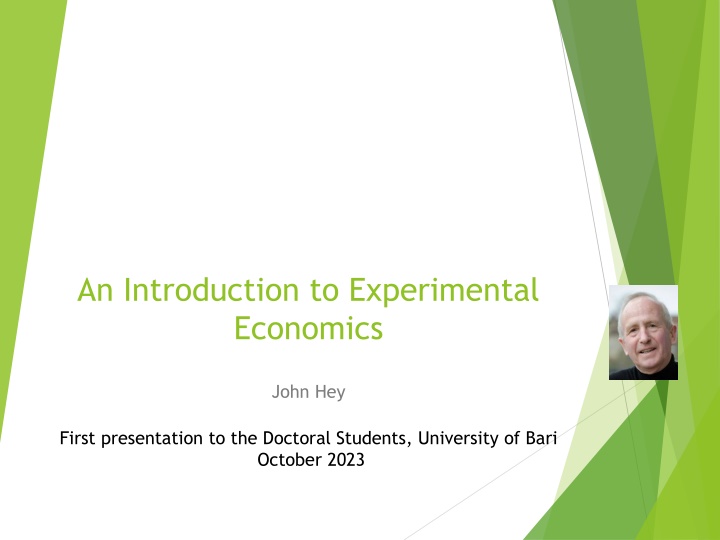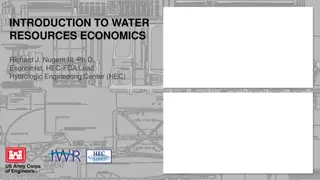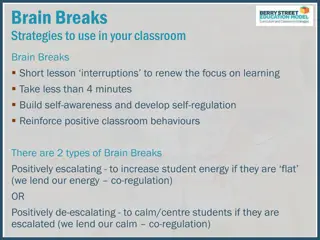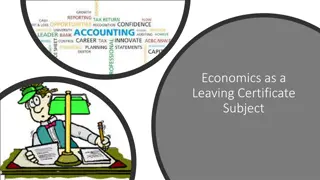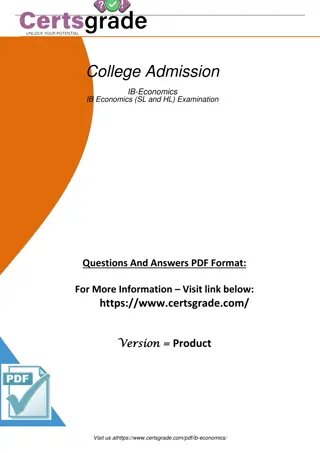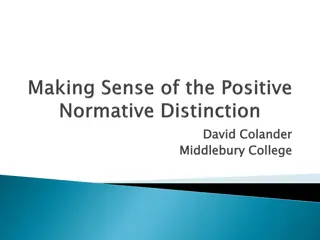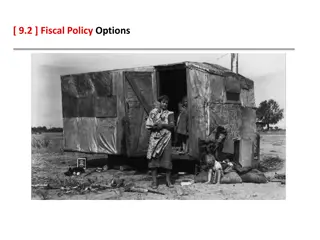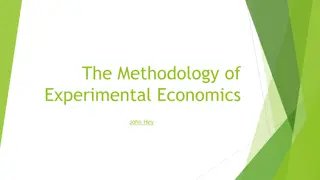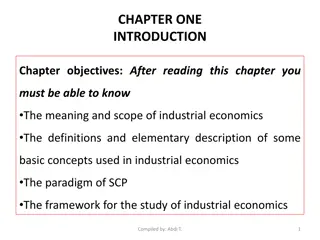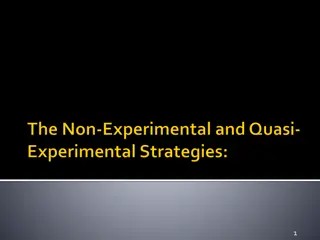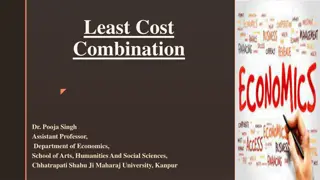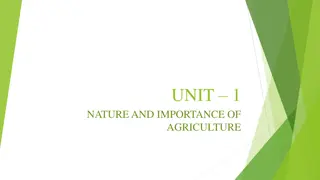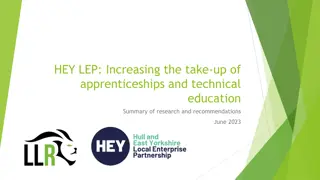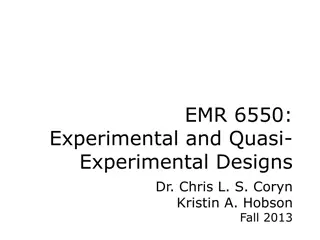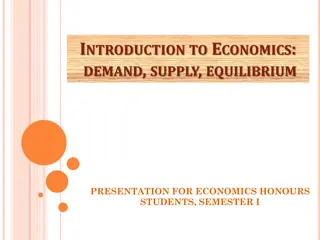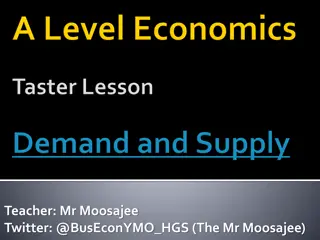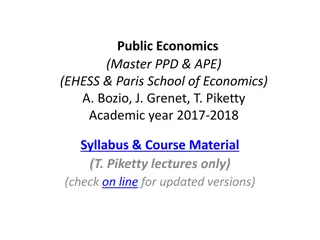Introduction to Experimental Economics by John Hey: A Comprehensive Overview
Explore the interconnected realms of Experimental Economics and Behavioral Economics through the insightful lectures of John Hey, an Emeritus Professor at the University of York. Discover the methodology of testing economic theories for validity and the practical applications of experimental economics in understanding human behavior and decision-making. Visit the provided links for more information and delve into the world of experimental economics with this introductory lecture.
Download Presentation

Please find below an Image/Link to download the presentation.
The content on the website is provided AS IS for your information and personal use only. It may not be sold, licensed, or shared on other websites without obtaining consent from the author.If you encounter any issues during the download, it is possible that the publisher has removed the file from their server.
You are allowed to download the files provided on this website for personal or commercial use, subject to the condition that they are used lawfully. All files are the property of their respective owners.
The content on the website is provided AS IS for your information and personal use only. It may not be sold, licensed, or shared on other websites without obtaining consent from the author.
E N D
Presentation Transcript
An Introduction to Experimental Economics John Hey First presentation to the Doctoral Students, University of Bari October 2023
Information I am John Hey, Emeritus Professor of Economics and Statistics at the University of York. I have constructed a site for this course of lectures at https://www.york.ac.uk/economics/exec/universityofbari/ I am visiting the University of Bari, where I was Ordinario for 5 years, taught Microeconomia and Social Choice, and founded the Bari centre of experimental economics, to convince you all of the value of Experimental Economics , and to encourage you to use it. You can find my webpage at https://sites.google.com/york.ac.uk/john-hey/home You can send me emails at john.hey@york.ac.uk
Experimental Economics and Behavioural Economics These are very closely interlinked. Each feeds into the other. Behavioural Economics is a branch of Economics which describes the economic behaviour of human beings. (This really is what economics ought to be about, but conventional (neoclassical) economics has too strong assumptions about human rationality. Behavioral economics relaxes these assumptions.) Experimental Economics is a method by which economic theories (both behavioural and conventional) are tested for their validity. If the test shows that the theory is valid, all well and good. If not, the theory is revised and then tested again, and so on, until it is valid.
Preamble This is a lecture on experimental economics, And not on experimental psychology Or experimental anything-else. I presume a basic understanding of economics. Stop me if I am assuming too much.
This lecture This is an overview lecture giving you a glimpse of what experimental economics is about and what an economics experiment looks like. I give detail and practical advice in the other lectures of the course.
Overview I first look at markets Then games Then static individual decision-making Then dynamic individual decision-making Then a very brief overview of other experiments. But first, three questions for you
A first question for you What would you think about a scientist who wants to test the efficiency of a drug who collects data on the sale of the drug (in some town or region or country) and data on the incidence of the problem that the drug is supposed to cure (in that town or region or country), and statistically looks at the relationship between the latter and the former?
A second question for you What would you think about a scientist who wants to test whether a new brand of tyres is safer than the old one who collects data on the sales of the tyre (in some town or region or country) and data on motor accidents (in that town or region or country) and statistically looks at the relationship between the latter and the former?
A final question What would you think about a scientist who wants to test whether raising interest rates increases saving who collects data on interest rates over time in some country and saving in that country, and statistically looks at the relationship between the latter and the former?
The answers in each case? We would not be impressed. One problem is that there are many other factors which may affect the relationship. In the first two cases the scientist would conduct a laboratory experiment. Keeping all other factors (not of interest) fixed. Why cannot economists do the same? Well, experimental economists do.
Economics Economics is theory driven and based on axioms. Economics has strong notions about rationality, particularly about rational expectations and dynamic behaviour. Central to economics is equilibrium. Economics usually relies on indirect tests of theories (using data from the economy with many uncontrolled factors) rather than direct experimental tests under controlled conditions.
Experimental economists claims All theory is built on top of individuals (usually maximising their own self-interest). Theory does not specify which individuals. We can test/investigate most economic theories, including macro models and those of international trade as these usually involve a small number of (representative) agents. Experiments enable us to find what is wrong with existing theories and to suggest new ones. This appears to us to be scientific progress. Let me start with an example.
Equilibrium A familiar text-book figure
Comparative statics A familiar text-book exercise
What does the theory say? That equilibrium exists. It is an equilibrium in the sense that once we are there, no individual can gain by changing his or her decision. That if there is an upwards shift in the demand curve then the equilibrium price and quantity increase. Does it say that the equilibrium will be attained? No. Does it say that the price will move upwards? No. It cannot because there is no-one to set the price.
So why not see what happens? We need to give the agents the ability to announce prices (not necessarily set them). This is what Vernon Smith (Nobel Prize Winner in 2002) did in his path-breaking experiments in the 1960 s. We need to give incentives to the agents/subjects to act as in the theory.
How we set up a market experiment Notice that this is a market for a hypothetical good. We need to answer the following questions: How do we get people to act as potential buyers? How do we get people to act as potential sellers? How is the price formed? What might the experiment tell us about the theory?
Demanders What is a demand curve? What are reservation prices? What does a demand curve for a discrete good look like? Suppose an individual wants to buy at most one unit of a discrete good and his/her reservation price* for the one unit is 6. What does his/her demand curve look like? what does it tell us? * The maximum that he/she is willing to pay.
Demand curve of this demander
Aggregate demand curve Suppose now there are five demanders, each wanting to buy at most one unit, with reservation prices 10, 9, 6, 5 and 2. What does their aggregate demand curve look like?
Inducing subjects to act as demanders How do we do this? We tell each subject that they are potential buyers of a hypothetical good that will be traded in the experiment, and that if they buy they will be paid by the experimenter a given sum of money (their reservation value but we do not use this word) and that they will have to pay the price agreed out of this money. An obvious incentive mechanism. They get their surplus. We can obviously generalise this.
Suppliers What is a supply curve? What are reservation prices? What does a supply curve for a discrete good look like? Suppose an individual wants to sell at most one unit of a discrete good and his/her reservation price* for the one unit is 5. What does his/her supply curve look like? * The minimum that he/she is willing to accept.
Aggregate supply curve Suppose now there are five suppliers, each wanting to sell at most one unit, with reservation prices 1, 4, 5, 7 and 9. What does their aggregate supply curve look like?
Inducing subjects to act as suppliers How do we do this? We tell each subject that they are potential sellers of a hypothetical good that will be traded in the experiment, and that if they sell they will receive the price agreed and that they will have to pay to the experimenter a given sum of money (their reservation value but we do not use this word) out of this money. An obvious incentive mechanism. They get their surplus. We can obviously generalise this.
Who trades? Do all in the competitive equilibrium? Can all outside competitive equilibrium? Why do we like competitive equilibrium?
Trading mechanisms? In the theory? In the real world? I list some here. Double Auction Walrasian Auctioneer Clearing House Bilateral Bargaining Sellers set prices Buyers set prices
Double auction The market period lasts a pre-determined time. At any point buyers can make bids: a price at which they are willing to buy. At any point sellers can make asks: a price at which they are willing to sell. Bids and asks are posted. At any time a buyer can accept a posted ask of a seller and then a trade takes place at that price. At any time a seller can accept a posted bid of a buyer and then a trade takes place at that price. There is no communication between the subjects and they do not know each others reservation prices.
The classic example from smith 1962 11 potential buyers with reservation prices from 3.25 to 0.75. 11 potential sellers with reservation prices from 0.75 to 3.25. Equilibrium price 2.00.
What happened in period 5? Magic!?
The theorists are vindicated! But A repeated market repeated 15 times. From Smith, Suchanek and Williams 1998 All subjects endowed at the start with units of an asset that paid a random dividend with mean 24 cents each period. Endowed also with ultimately worthless experimental money with which to trade. Note what should be the equilibrium price of the asset: At the start with 15 periods to go, in each of which the expected dividend is 24, the price should be the value of the asset=15*24=360. (This assumes that subjects are risk-neutral.) Then the price should fall 24 cents each period.
What happened We observe a bubble and a crash! What was happening?
Game theory Again here theorists are obsessed with equilibrium here the Nash Equilibrium in which everybody is doing the best for themselves given what everyone else is doing. It is an equilibrium in the sense that once we are there, no individual can gain by changing his or her decision. But is it attained? Only experiments can tell us.
Setting up an experiment to test the equilibrium of a game Decide the number of players in the game. Show them all the Payoff Matrix which specifies, for each player, the payoff he/she would get for each set of decision of all the players. Get them all (in a simultaneous play game) to simultaneously take their decision. Use the Payoff Matrix to determine the payoff of each player. Pay them. End of experiment.
Setting up a test of Game Theory (2-person game) Invite 2 people to the lab. Show them the payoff matrix Tell them the rules of the game . If a simultaneous play game, get player A to choose a row and Player B a column simultaneously and without communication. Pay them their payoffs and let them leave.
That was a symmetric game The two players move simultaneously. Player B B 1 2 Player A 1 2 10, 10 0, 12 12, 0 11, 11 First number payoff to A; second - payoff to B. What would you do? What does the theory predict? The theory works! Experiments with real money prove it.
But The two players move simultaneously Player B B 1 1, 1 0, 1001 2 Player A 1 2 1001, 0 1000, 1000 First number payoff to A; second - payoff to B. What would you do? What does the theory predict? The theory does not work! Experiments with real money prove it.
What does this tell us? Game theory predictions are satisfied sometimes but not always. It depends on the out-of-equilibrium payoffs which are irrelevant to the theory. Is out-of-equilibrium play a sign of trust, other- regarding preferences, or better-than-Nash rationality? Other experiments can tell us.
A sequential-play game A simple sequential one-shot Trust Game. Two players, A and B. A has some money given to him/her by the experimenter; he can pass some to B and the amount becomes quadrupled. Then B has to decide how much to pass back to A. What is the Nash Equilibrium? What do experiments show? That Player A does pass some money often 50% of the given amount. Trust? Other-regarding preferences? Better-than-Nash rationality?
Axioms Economists love axioms definitions of rationality . They are beautiful and intellectually appealing. Consider this axiom which is called the Independence Axiom. Suppose you prefer A to B, where A and B can be anything. Now suppose you are offered the following risky choice: between Left and Right. Which would you choose? C is anything. p is anything. A B p Left Right C 1-p C These are both risky choices with probabilities p and 1-p.
Now a test What would you choose here? 400 0.8 300 0 0.2 And here? 0.25 0.2 0.75 Are your decisions consistent with the Independence Axiom?
This is the Allais paradox The Independence Axiom is the crucial part of Expected Utility theory. Experimental tests of this axiom and others have led to the development of new theories of behaviour under risk, most notably Prospect theory and Rank-Dependent Expected Utility theory. Allais (Nobel Prize 1988) was an early experimenter in the field.
Dynamic choice Dominated by strong ideas of rationality, particularly that of solving dynamic problems by backward induction (underlies rational expectations). Consider the following dynamic problem. In these green squares are decision nodes and red squares are where Nature moves, moving Up or Down with equal probabilities. The amounts at the end are payoffs. What would you do at the first decision node? This is from an experiment of The Three Johns.
The Experimental Design The payoffs in the top half of the tree are 8, 13,16, 8, 6, 20, 6,18 The payoffs in the bottom half of the tree are 15, 17, 2, 4, 29, 8, 8, 0 The ordered payoffs in the top half of the tree are 20, 18, 16, 13, 8, 8, 6, 6 The ordered payoffs in the bottom half of the tree are 20, 17, 15, 8, 8, 4, 2, 0 Top dominates bottom but this ignores the second decision.
